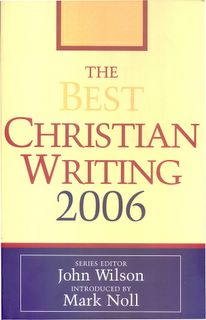
Former Paradise resident publishes new edition of 'Best Christian Writing'
By DAN BARNETT
It's been more than 10 years now since John Wilson began editing the bimonthly "Books and Culture: A Christian Review," published by Christianity Today, Inc. out of Chicago. The answer to the secularist New York Review of Books, Books and Culture is far less predictable in the books it reviews and the reviewers selected.
The November-December 2005 issue, for example, boasts an appreciation of Jan Karon's "Mitford" novels, an examination of Hebraic purity laws, reviews of the latest Harry Potter tome and books about polio, and an essay on mythologizing Einstein. Reviewers come from Calvin College, Yale University, Duke Divinity School, and the Christian Vegetarian Association.
Wilson's picture shows up in the 1965 "Argo," the Paradise High School yearbook. He's a junior; I was a sophomore. He went on to become, in the words of an article a few years ago in The Atlantic, a "polymath"; I went on to become someone who had to look up the word "polymath." But God's ways are past finding out and over the last few years I've been graced by being in John's company.
"The Best Christian Writing 2006" ($17.95 in paperback from Jossey-Bass), edited by Wilson, with an introduction by Wheaton College historian Mark Noll, is another grace. The 20 pieces here assembled offer spiritual reportage from the trenches, but by "spiritual" I don't mean a nebulous new-agey focus on the ethereal. I mean instead the attempt by Christians of many stripes -- Orthodox, Catholic and Protestant -- to come to grips with the call of God on their lives.
An interview with Eugene Peterson (author of "The Message" Bible paraphrase) makes this clear. Peterson tells Mark Galli, managing editor of Christianity Today, that "spirituality" defined as "becoming emotionally intimate with God" is "a naive view of spirituality. What we're talking about is the Christian life. It's following Jesus. Spirituality is no different from what we've been doing for two thousand years just by going to church and receiving the sacraments, being baptized, learning to pray, and reading Scriptures rightly. It's just ordinary stuff.
"This promise of intimacy is both right and wrong. There is an intimacy with God, but it's like any other intimacy; it's part of the fabric of your life. In marriage you don't feel intimate most of the time. Nor with a friend. Intimacy isn't primarily a mystical emotion. It's a way of life, a life of openness, honesty, a certain transparency."
Arranged by the authors' last names, the book juxtaposes the "Confessions of a Traveling Calvinist" (by Fuller Seminary president Richard Mouw) with "The Persistence of the Catholic Moment" (by First Things editor Richard John Neuhaus, a former Lutheran). Canadian Gideon Strauss writes of "My Africa Problem ... and Ours" (about the contemplation of action) which abuts American Daniel Taylor's meditation on a visit to the former monastery on Skellig Michael, "a seven-hundred-foot-high pinnacle of water-and-wind-worn rock that rises like Excalibur out of the Atlantic waves off the southwest coast of Ireland" (about the action of contemplation).
The authors of the selections try to think "christianly" about their world -- about Islam; about what children are for; about those with mental illness.
Two articles confront Mel Gibson's "The Passion of the Christ." Frederica Mathewes-Green, from an Orthodox perspective, sees the bloody crucifixion in the film as a focus foreign to the New Testament Gospels. Gregory Wolfe, publisher and editor of Image: A Journal of the Arts & Religion, has a different take. "However individual and controversial and subject to criticism his rendition may be, Mel Gibson's message is nourished and shaped by his respect for an ancient tradition. And at the heart of that tradition is the belief in the unimaginable depth of God's passion for us."
This is echoed in "Brother John" by August Turak, the winner of the John Templeton Foundation's "Power of Purpose" international essay competition. The author reflects on his frequent visits to Mepkin Abbey near Charleston, S.C., and specifically on Brother John, a monk who one evening offers an umbrella to the visitor who has forgotten his own. The essay quotes a line from Pascal, as if God is speaking, and looks to the great gift that is celebrated this, and every, Christmastide:
"You would not seek Me if you had not already found Me, and you would not have found Me if I had not first found you."
Dan Barnett teaches philosophy at Butte College. To submit review copies of published books, please send e-mail to dbarnett@maxinet.com. Copyright 2005 Chico Enterprise-Record. Used by permission.
No comments:
Post a Comment